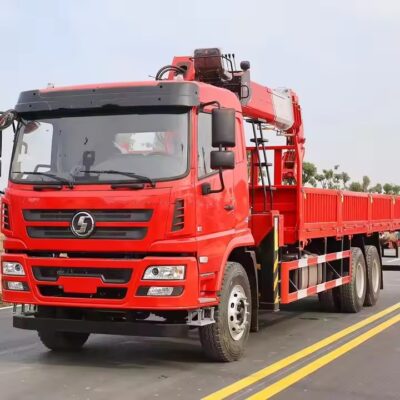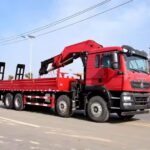Characteristics
-
Portability
The products of the small hoist series are small in size, light in weight, compact, and exquisitely structured, making them highly portable. These hoists are designed to be easily carried around, which is extremely convenient for various job sites. Whether it’s a small home renovation project or a quick on-site repair task, their portability means that they can be swiftly moved to where they’re needed. In comparison to large-scale industrial hoists, these small ones can fit into the trunk of a car or be carried by hand, saving a great deal of transportation effort. -
Easy Installation
Installing a small hoist is a breeze. Place the power unit near a window (or balcony), assemble the support bracket part, and insert it into the base holes of the power unit. The whole installation process can be completed within just 5 minutes. This simplicity makes it accessible even for those with limited technical skills. For DIY enthusiasts or small business owners who need to quickly set up a lifting solution, this quick installation feature is a huge advantage. It doesn’t require complex tools or professional installation teams, reducing both time and cost. -
High Lifting Speed
Small hoists offer remarkable lifting speed. They can lift 1 meter in just 4 seconds. For a 10-story building, it only takes 3 minutes for a round trip. When used with the “special tools”, the lifting speed is even more astonishing, and the higher the floor, the more prominent this speed advantage becomes. In a busy construction site or a high-rise building maintenance project, this rapid lifting speed can significantly boost work efficiency. It allows workers to transport materials, tools, or equipment much faster than traditional manual methods, ultimately shortening the project duration. -
Wide Range of Applications
These hoists run on 220-volt single-phase power, making them suitable for a diverse range of industries and households. Decorating companies, hoisting companies, installation companies, moving companies, factory workshops, repair departments, storage warehouses, and individual families can all benefit from them. They have versatile installation locations too. Not only can they be installed indoors, but they can also be set up on rooftops. Using scaffolding, they can be incorporated into large construction projects, or they can substitute gantry hoists in small building projects. They are capable of installing protective nets, billboards, facilitating rooftop waterproofing and cast-in-place projects, well repair, pump maintenance, fruit storage, and grain drying, among other tasks. -
Easy to Operate and Safe
Learning to operate a small hoist only takes about an hour. In case of any unexpected situations during operation according to the instruction manual, the lifted object will touch the limiter and trigger the travel switch, immediately cutting off the power supply, ensuring safe operation. This user-friendly operation design and reliable safety mechanism make it suitable for novice operators. Even without extensive training, workers can quickly get on board with using the hoist, reducing the learning curve and potential safety risks at the same time.
As technology advances, small hoists are constantly evolving. New materials are being used to further reduce their weight while maintaining strength. 例えば, lightweight yet high-strength alloys are replacing some of the traditional metal components. In terms of power systems, more energy-efficient motors are being developed, which not only cut down on electricity consumption but also have better performance in terms of torque output and speed stability. さらに, with the rise of smart home technology, there are attempts to integrate small hoists with smart control systems, allowing for remote operation via mobile apps or voice commands, greatly enhancing user convenience.

Daily Maintenance そして Care Methods
-
Wire Rope Maintenance
The winding of the wire rope should be neatly, densely, and tightly arranged. Regularly check its wear condition. If any problems are detected, replace it immediately. The wire rope is a crucial part of the hoist’s lifting mechanism. Any signs of fraying, kinking, or excessive wear can lead to a sudden breakage during operation, which could cause serious accidents. By keeping it in good condition and replacing it promptly when necessary, the safety and reliability of the hoist are maintained. -
Proper Shutdown
When shutting down the hoist, it should be in an unloaded state. Do not leave heavy objects suspended in the air for a long time. Leaving a load hanging can put unnecessary stress on the hoist’s components, such as the motor, 歯車, and ropes. 時間とともに, this can lead to premature wear and potential failure. It’s also a safety hazard as an unexpected release of the load could cause damage to people or property below. -
Sound Check
During use, frequently check if the equipment makes any abnormal noises. Unusual sounds can be an indication of mechanical problems, such as misaligned gears, loose bearings, or a malfunctioning motor. Detecting these issues early through regular sound checks allows for timely maintenance and repair, preventing more serious breakdowns. -
Brake Adjustment
If the electric motor’s brake shows a downward sliding when parked, remove the fan cover and fan blade. Open the rear cover and place an appropriate gasket under the automatic spring. This adjustment helps to restore the proper braking function of the motor. A faulty brake can cause the lifted object to fall unexpectedly, so it’s essential to address any brake issues promptly. -
Regular Servicing
After a cumulative use of 500 hours, carry out a maintenance session. Clean the dirt, replenish the grease, and adjust the fastening bolts. Regular servicing like this helps to keep all components of the hoist in good working order. Grease replenishment reduces friction between moving parts, while bolt adjustment ensures that all parts are firmly connected, minimizing the risk of component loosening during operation.

In addition to these basic maintenance steps, as small hoists are used in more complex environments, additional precautions need to be taken. 例えば, in humid or corrosive environments, special anti-corrosion coatings should be applied to metal parts, and more frequent inspections are required to detect any signs of rust early. In dusty environments, better dust-proof measures, such as installing dust covers on key components, can prevent dust from entering and affecting the performance of the hoist.
With the growing popularity of small hoists, safety education for operators is also becoming more important. Training programs should not only cover basic operation and maintenance but also emergency handling procedures. 例えば, what to do in case of a sudden power failure during lifting, or how to deal with a jammed lifting mechanism. By enhancing operator safety awareness and skills, the overall safety level of small hoist use can be further improved.
さらに, in the manufacturing process, strict quality control standards need to be adhered to. From the selection of raw materials to the assembly of components, every step should be carefully monitored. High-quality bearings, motors, and ropes are essential for the long-term stable operation of the hoist. Manufacturers should also conduct regular product testing, simulating various real-life usage scenarios to identify and fix any potential design flaws or quality issues before the products reach the market.
As the demand for small hoists in different industries continues to expand, customization options are emerging. Some customers may require hoists with specific lifting capacities, different power options, or unique installation requirements. Manufacturers are starting to offer customized solutions to meet these diverse needs, further promoting the widespread application of small hoists.









